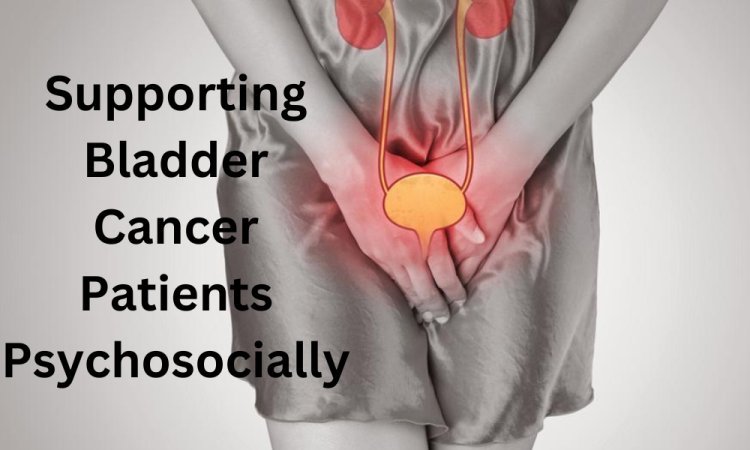Supporting Bladder Cancer Patients Psychosocially

The diagnosed bladder cancer generally signifies the beginning of a new chapter and also the overall health of your body, your health as well as your social circle can be affected by the disease. Additionally, psychosocial support from your caregivers and doctors from the most well-known cancer centers in the USA is an additional resource that could aid patients in overcoming problems they may confront at the time of diagnosis, as well as during treatment and afterward. The need for clinical and individualization for patients suffering from bladder cancer will become evident when the support offered is according to their medical situation. Furthermore, patients' quality of life of patients will improve over time.
Support for bladder cancer patient's psychosocial patients plays an essential role in enhancing their mental and emotional well-being throughout treatment. While medicines such as Lenalidomide 25 are utilized to treat cancer, er, however, dealing with the psychological side effects is equally important for a holistic approach to treatment.
The Psychosocial Impact
Treatment and diagnosis of bladder cancer can result in a range of emotions like anxiety depression, fear, and anxiety. This can trigger anguish, as well as sadness as well as deep, air, and anger. Patients might not be able to confront the uncertainty that surrounds their future while dealing with the changes in their bodies that result from surgeries, as well as emotional stress due to treatment procedures which can lead to the development of urinary incontinence or sexual dysfunction. These symptoms are like having an impact on every aspect of your life, like relationships with employees as well as everyday routines.
Support from others is crucial for individuals with bladder cancer, as they may face social isolation due to treatment effects or stigma. Emotional well-being plays a significant role in overall health, and managing mental stress is essential. In some cases, medications like Lenalidomide 15 mg can support treatment plans, helping patients maintain stability during their recovery journey.
Addressing Psychosocial Needs
Healthcare professionals like nurses, psychologists, and oncologists play a vital role in helping patients with bladder cancer deal with their psychosocial challenges. Assessing the patient's psychological state each time they visit gives health professionals time to determine if patients require assistance with their condition.
It is vital to consider psychosocial needs during cancer treatment because emotional well-being is an important factor that affects the process of recovery. Medications such as Lenalidomide 5 mg do not just target the disease but also require a holistic approach to aid patients in coping with the difficulties of treatment.
Psychosocial therapies specifically targeted for bladder cancer patients might include:
- Psychology and Counseling Through either group or individual counseling, patients are taught to manage their anxiety, build coping mechanisms, and improve their interpersonal skills in addition to other things. CBT can be extremely efficient in dealing with issues of anxiety and depression. Anxiety.
- Support groups Being part of support groups can help bladder cancer patients avoid difficult times and share ways to work with other patients. In addition, they gain the support of others. They may be either in person or online which means that patients have the option of choosing one appropriate for them, regardless of the location from home or sick.
- Information and Education Information Comprehensive and specific information on bladder cancer, its numerous treatments, and its negative effects can do more than ease anxiety and stress, but can also motivate patients to make rational and informed choices. Informational materials can assist patients with practical concerns such as transportation and money.
- For those undergoing treatment, Lenalidomide 10 mg plays a crucial role in managing specific conditions while supporting overall well-being and enhancing quality of life.
- Peer Mentorship programs: In the case of bladder cancer patients who have just been diagnosed, a person who has experienced similar struggles will receive emotional support as well as practical advice. They can depend on the most efficient. Peer mentors also serve as a source of motivation and assistance for patients, thereby making them stronger and more durable.
Challenges and Future Directions
Psychosocial support services may help bladder cancer patients but there are issues in dispersing those benefits as well as making them available and available at the scale of. Insufficient resources, a lack of resources, or the accessibility of healthcare services in various communities can hinder the creation of a more complete support system, especially in areas that aren't accessible to health services.
The next steps to improve the amount of psychological assistance available to patients with bladder cancer should focus on:
- A psychosocial care center could be integrated into cancer treatment by using the multidisciplinary model of the survivorship plan and care team for treatment.
- The development of educational programs illustrates how doctors should consider the psychological aspects of their work when they provide assistance.
- Making use of technology to provide virtual assistance and also counseling sessions using telehealth, if they are required.
- By presenting policy suggestions to regulators, and asking for various adjustments to the system of healthcare it is possible to grant psychosocial care a greater priority and offer communities who do not have these services the opportunity to avail these services.
Conclusion
TPsychologicalsupport of all kinds is the most important aspect of multimodal therapy for patients with bladder cancer. It helps with the social, psychological, and practical issues that can be encountered during and after therapy sessions. Through the integration of psychosocial intervention into the treatment process, and establishing collaborations between healthcare professionals from the most effective treatments using ayurvedic medicine in the USA as well as researchers, policymakers, and advocacy organizations, we can increase the outcome and quality of life for those who are suffering of bladder cancer. Together, we can provide the needed aid and resources for patients in their fight against cancer and with the hope of the possibility of finding a solution.
What's Your Reaction?










